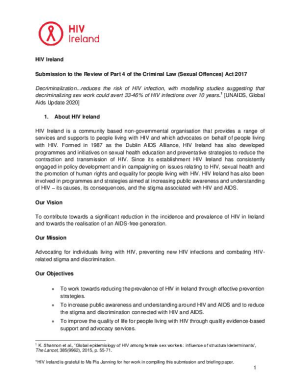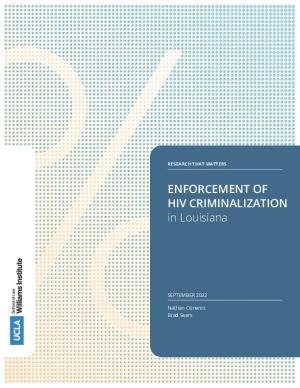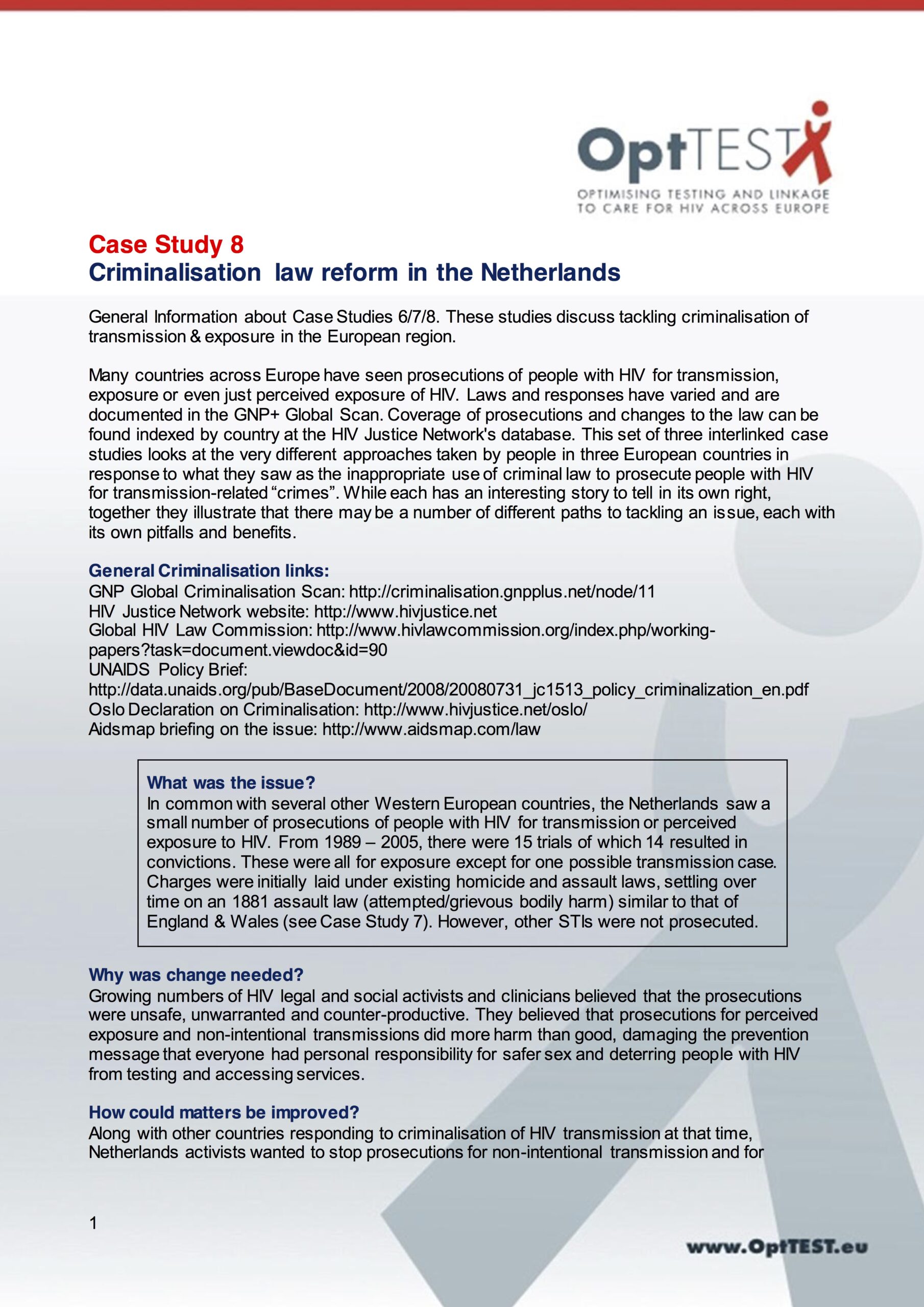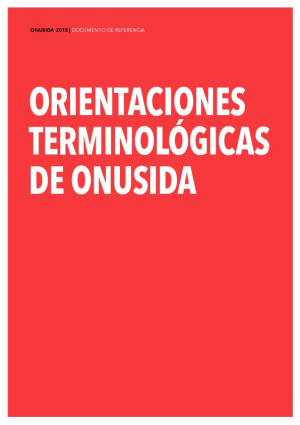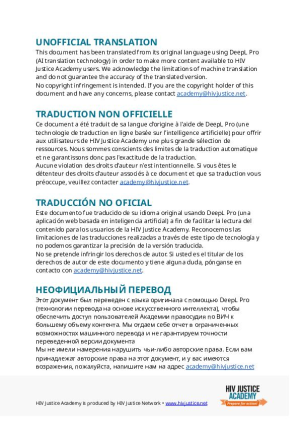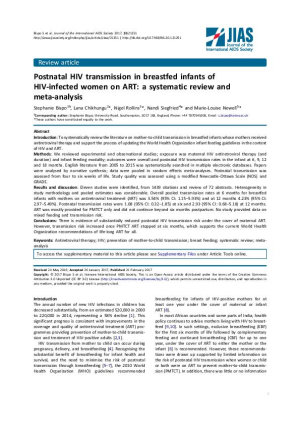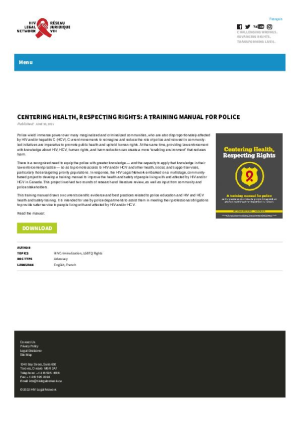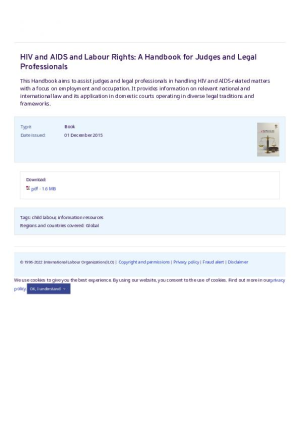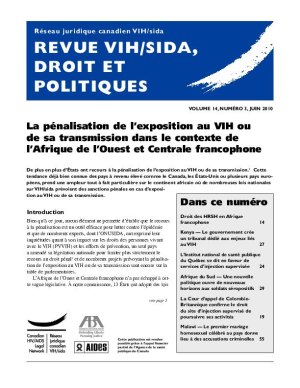Submission to the Review of Part 4 of the Criminal Law (Sexual Offences) Act 2017
HIV Ireland's submission as part of the Review of Part 4 of the Criminal Law (Sexual Offences) Act 2017. The submission urges the Review Committee to fully decriminalise sex work in order to respect, protect and fulfil the right to the highest attainable standard of health of sex workers; to take into account the negative impact that current legislative provisions are having on sexual health and to consider the detrimental effects that current legislative provisions are having on access to justice for sex workers and to ensure that their voices are feature prominently throughout the review.
Enforcement of HIV Criminalization in Louisiana
Using data obtained from the Louisiana Incident-Based Reporting System and from the state’s most populous parishes, this study examines the enforcement of HIV criminalization laws in Louisiana since 2011.
OptTest Hoja de tips 8 – ¿Cómo podemos crear alianzas entre la comunidad, los médicos y la sanidad pública?
Consejos para gestionar alianzas y promover su crecimiento, mediante la definición de objetivos, participantes y logística.
Este documento fue traducido de su idioma original usando DeepL Pro (una aplicación web basada en inteligencia artificial) a fin de facilitar la lectura del contenido para los usuarios de la HIV Justice Academy. Reconocemos las limitaciones de las traducciones realizadas a través de este tipo de tecnología y no podemos garantizar la precisión de la versión traducida.
Orientaciones terminológicas de ONUSIDA (versión de 2015)
El lenguaje puede determinar creencias e influir sobre el comportamiento. El uso de un lenguaje apropiado tiene el poder de fortalecer la respuesta mundial a la epidemia de sida. Por ello, el Programa Conjunto de las Naciones Unidas sobre el VIH/sida tiene el gusto de poner a disposición de todos los miembros del personal, los colegas y los demás asociados en la respuesta mundial al VIH esta guía de preferencias terminológicas de forma gratuita.
Declaración pericial en el caso de E.L. sobre el riesgo de la lactancia materna
Declaración jurada de la Dra. Ruth M. Bland, experta médica con amplia experiencia en la investigación en el campo de la transmisión del VIH, en la que concluye que, en su opinión, en el caso de E.L. el riesgo de transmisión del VIH al niño tras una única exposición a la leche materna mientras está en tratamiento antirretroviral es "infinitesimal".
Postnatal HIV transmission in breastfed infants of HIV-infected women on ART: a systematic review and meta-analysis (2017)
A systematic review of all literature to date (2017) on mother-to-child transmission in breastfed infants whose mothers received antiretroviral therapy and support the process of updating the World Health Organization infant feeding guidelines in the context of HIV and ART, which concludes that there is evidence of substantially reduced postnatal HIV transmission risk under the cover of maternal ART.
- Alternative links
- Read on the JIAS website
Centering Health, Respecting Rights: A Training Manual for Police
This training manual draws on current scientific evidence and best practices related to police education and HIV and HCV health and safety training. It is intended for use by police departments to assist them in meeting their professional obligations to provide safer service to people living with and affected by HIV and/or HCV.
HIV and AIDS and Labour Rights: A Handbook for Judges and Legal Professionals
"This Handbook aims to assist judges and legal professionals in handling HIV and AIDS-related matters with a focus on employment and occupation. It provides information on relevant national and international law and its application in domestic courts operating in diverse legal traditions and frameworks." ILO
La pénalisation de l’exposition au VIH ou de sa transmission dans le contexte de l’Afrique de l’Ouest et Centrale francophone
Examine la pénalisation de l'exposition au VIH ou de sa transmission en Afrique francophone et analyse ses effets directs et indirects sur la lutte contre l’épidémie et sur les droits des PVVIH dans ce contexte.
Disparate risks of conviction under Michigan’s felony HIV disclosure law: An observational analysis of convictions and HIV diagnosis, 1992-2010
Found uneven application of HIV criminalization laws in the state of Michigan, with black men and white women having a comparatively greater risk of conviction than white men or black women. White women had the highest conviction rate of any group analysed, suggesting they may face a particular burden under these laws. Many of the white women convicted were especially disadvantaged by issues such as poor mental health, substance abuse and homelessness.

